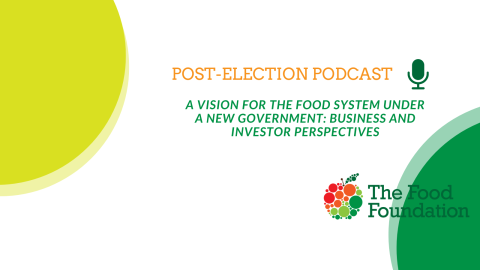22 July 2024
Lobbying for Good: What investors would like to see from the new government

In our latest Lobbying for Good blog, our Responsible Investor Lead Sarah Buszard sat down with Matt Lomas, Engagement Director for Investment at Guy's & St Thomas' Foundation to hear about what their priority policy asks are for the new Government.
Why are investors an important and relevant voice when it comes to food policy?
At Guy’s & St Thomas’ Foundation we want to invest in a healthier society. As long-term investors, we care about the whole economy and society being able to flourish, because ultimately the success of our investments depends on both being healthy.
However, nearly two thirds of the UK population have overweight or obesity. It’s clear that unhealthy diets are having a hugely detrimental effect on people's livelihoods and massively impacting the country’s healthcare costs and economic productivity.
We need to change the food environment for things to improve because people are being flooded with unhealthy choices. And yet food companies are coming under increasing pressure to respond to regulations and changing consumer preferences that are demanding healthier food as well as action on climate change and nature loss.
We think this pressure will only grow, so companies should get ahead of the curve and do it now.
There is an assumption, by some, that investors only care about quarterly profits. That’s not the case, especially for responsible long-term investors such as the Foundation and those represented by the Investor Coalition on Food Policy, with the £6tn of Assets Under Management (AUM).
Investors can influence businesses and the wider economy because they help finance them. As Rachel Crossley, Head of Stewardship - Europe at BNP Paribas Asset Management, so eloquently put it in her recent contribution to The Food Foundation’s Lobbying for Good blog series, “it’s because of this influence that investors should be recognised as key stakeholders in policy development”.
As investors we have a duty to respond to our beneficiaries' needs. We know many people who hold pensions want their pensions to reflect their values. In the case of our Foundation, our vision is of a society that helps everyone stay healthier, for longer.
As part of this, we are working towards creating the conditions for healthier food environments and reducing the harmful effects of climate change.
What do you think are the ‘low cost’ policy actions the new Government can take in their first 100 days of government to help the food industry and investors progress against their health and sustainability targets?
Overall, we would like the Government to commit to Henry Dimbleby’s National Food Strategy (NFS), commissioned by the last Government, which is a well-thought-out strategy to tackle diet-related ill-health and environmental degradation.
However, in the short-term, the new Government should prioritise working in partnership with industry to fully implement the regulations around foods high in fat, salt and sugar (HFSS) which were due to come into force in 2023, but some of which were then delayed until October 2025.
These are the restrictions on volume promotions for HFSS foods. This covers, for example ‘buy one get one free’ (BOGOF) offers for junk food, as well as restrictions for advertising online and on TV before the 9pm watershed.
We know that many companies were already preparing for and support these regulations; for example, Tesco and Sainsbury's have already implemented the HFSS volume restrictions. Fully implementing these would go quite some way towards improving food environments.
We also want to see mandatory reporting on the nutritional and sustainability aspects of foods sold in the UK, covering all large food and beverage companies. The previous Government introduced the Food Data Transparency Partnership (FDTP) in February 2023 to consult on which metrics companies should report on, but at present the plans are for the health metrics to only be reported on a voluntary basis. This needs to change.
While the initial scope of the FDTP was to explore mandatory reporting, it has been disappointing to see that commitment being rolled back to voluntary reporting only. We know that voluntary schemes are much less effective than mandatory ones.
Again, many of the UK's leading food companies support a move to mandatory reporting because it will mean that they will operate under a 'level playing field' with other companies. Companies often want to do the right thing, but they need Government to create the enabling environment – by working together, positive change is possible here.
What are the longer-term changes you would like to see Government make over the next five years to enable a healthy and sustainable food system?
Action is needed to support a healthy and sustainable food system. For example, the introduction of a Sugar and Salt Reformulation Tax, building on the success of the Soft Drinks Industry Levy (SDIL).
This could either be an upstream levy, as envisaged in the National Food Strategy, applied to all sugar and salt sold for use in food manufacturing or catering, with exceptions for retail ingredients.
Or it could be a levy applied to certain, non-staple food categories like confectionary, cakes or desserts. This would create incentives for manufacturers to introduce healthier foods and allay their fears that brands that are less concerned by health would undercut them.
This won’t be without its challenges. We acknowledge that there are legitimate fears that actions of this nature could increase the cost of food, but ultimately we need to rebalance the relative cost of healthy and less healthy foods given that unhealthy food is currently significantly cheaper per calorie than healthy foods.
The last thing we would want is for food prices to disproportionately impact disadvantaged low-income consumers. We therefore support the NFS's recommendations to balance any unintended consequences of a Sugar and Salt Tax with measures to increase access to fresh, healthy food to people on low incomes, including for example, expanding free school meals, the Holiday Activities and Food programme, and Healthy Start.
We also support other key parts of the NFS. It is an excellent plan that was commissioned by the previous Government to reform our food system for people and planet. The new Government can make a big difference by picking it up, dusting it off and implementing it.
Is there anything that the previous Government has introduced or was in the process of developing that has been particularly useful and that you would urge the new Government to continue?
We would strongly encourage the new Government to take the opportunity to continue and strengthen the FDTP project, because accurate, comparable data allows us as investors to identify the leading responsible companies which we can then invest in.
It enables us to compare companies' performance on areas like environmental sustainability and nutrition to better understand risks to our portfolio and society. We can all collectively then use this information to engage with companies and encourage progress, as we have done with retailers in the UK.
However, we can only do so much ourselves and at present the data is patchy and not easily comparable between companies, especially in the manufacturing and out of home sectors.
Mandatory reporting would be a significant and positive step to ensuring we are all working together to be accountable, enabling companies to do the right thing, making progress towards a healthier and more sustainable food system for everyone.

About Lobbying For Good
A growing number of food companies and investors want Government to take a more proactive role in helping them deliver on their health and sustainability strategies. As a new Government takes office, it's important to give those businesses and investors a platform and help to amplify their asks of policymakers.
In this blog series, we aim to highlight progressive voices within the food industry who - at the time of interview - we've identified as being leaders on specific areas within health and sustainability. We ask them what their vision is for a healthy and sustainable food system post-election and what specific actions the new Government should take in its first 100 days.
We hope their commitment to creating a fairer and more sustainable food system will continue into the future and that these blogs will inspire other business leaders to add their voices to the call for the new Government to regulate for positive change.

Matt Lomas is Engagement Director at Guy’s & St Thomas Foundation. He helps strengthen the management of the Foundation’s endowment and deliver on its responsible investing strategy and is responsible for the design and implementation of its engagement activities with its investments to drive better long-term performance and mission impact.

Sarah joined the Food Foundation in April 2023 as the Responsible Investment Engagement Lead. She leads on the work engaging the investor voice in advocating for more sustainable and healthy food systems. Sarah has a MA in International Environmental Law and Sustainable Development, with a focus on Human Rights Law. She is passionate about social change and creating a food system that works for both the planet and people’s health. Prior to joining the Food Foundation, she worked for over 10 years for the world's largest human rights organisation and did a stint in local government. Sarah also has expertise in governance and European languages.




